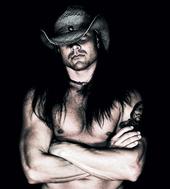To know Troy Westwood one need only listen between the lines of every song he has ever sung. From his time as the frontman for Eagle and Hawk to his latest foray into Indigenous Protest Folk Rock as Little Hawk, the repertoire he brings is a reflection of his spirit. Music is neither a habit nor a past-time for Little Hawk: it is his air.
And the depth of the songs he breathes in is matched by the sincerity of the songs he exhales. With influences as wide-ranging as reggae, rock, hip hop and folk, Little Hawk makes a masterpiece of filtering his musical inspiration and blending it with personally meaningful themes. His award-winning debut album, 1492-1975, was defined by the anger resulting from reading In The Spirit Of Crazy Horse, a book that was temporarily banned in the US for its critique of the FBI investigation of a shoot-out between its agents and members of the American Indian Movement at the Pine Ridge Oglala Lakota Nation in South Dakota.
While in the process of offering the lyrics of his first CD as a teaching tool, Little Hawk was introduced to the idea of redefining the Canadian anthem with a brutal honesty, of shining light in the shadowy places of Canada’s history. The raw subject matter was a dark but fertile muse and included the standoffs at Ipperwash and Oka, and the freezing death of Neil Stonechild. Home And Native Land, Little Hawk’s second album, is the controversial product of a sympathetic rage regarding those tragic events.
“Challenges regarding the CD will depend on the listener,†says Little Hawk of the audience’s potential reaction. “The subject matter of some of the songs may offend, or sadden. On the surface many of these songs would appear to be songs of sorrow, songs of things negative. The opposite is true; these are songs of strength, of pride, songs that point out harsh truths while trying to build bridges between two different cultures.â€
Home And Native Land was produced by the renowned Chris Burke-Gaffney and includes contributions by many acclaimed Canadian Aboriginal artists. “Sisters In Spirit†features singing troupe Asani and is a pledge to support women victimized by violence. “No Father No†examines sexual abuse under the pretense of Christianity and features the traditional singing of Ray “Co-Co†Stevenson (Eagle & Hawk). The Red Shadow Singers lend members Sabe and Adam Courchene to “Abitibi Leave The Whiskey Jack Forestâ€, a call to arms to defend a forest destroyed for profit.
Truly Little Hawk is the sentinel for the national conscience. He holds no ambition other than speaking the truth regardless of consequences. His music is his path and where it leads is shrouded in mystery. But even while trudging through the veils and the darkness, for Little Hawk two things remain perfectly clear:
"I would die for the people.
I will live for the people."
Produced by Chris Burke-Gaffney & Troy Westwood
All lyrics written by Troy Westwood
Engineered by Chris Burke-Gaffney
Mixed by Darren Johnston except "Left To Freeze" mixed by Chris Weibe
Mastered by Darren Johnston
Album cover concept by Darren Johnston & Troy Westwood
Cover design & Layout by Darren Johnston
Cover Photo by Adriana Capozzi
